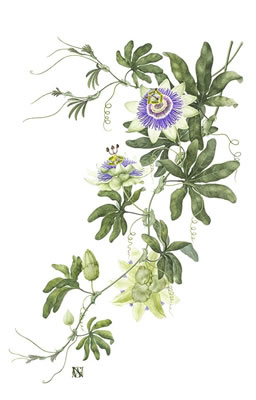AN INTRIGUING AND BEAUTIFUL FLOWER, THIS PLANT’S NAME IS A MISNOMER...BUT IT’S STILL ONE OF OUR FAVORITES.
The name Passionflower refers to the passion of Christ, and not to any ability of the plant to incite passion. Passionflower has been used in the traditional medicine of Europe and South America to treat anxiety, insomnia, and seizure. It may aid in sleep without leaving one feeling drowsy in the morning. It is a great herb for those who overwork, invigorating and aiding in concentration while at the same time, soothing and calming the nerves. It has also been traditionally used to treat GI disorders related to a nervous state.

MATERIA MEDICA: PASSIONFLOWER
Latin Name:
Passiflora spp.,
Passiflora incarnata L.
Family: Passifloraceae (Passionflower Family)
Parts Used: leaf, vine, flower
Energetics: bitter, cool, dry
Actions: analgesic, anodyne, antibacterial, antidepressant, anti-fungal, anti-inflammatory, antispasmodic, antitussive, aphrodisiac, cerebral vasorelaxent, diaphoretic, diuretic, hypnotic, hypotensive, nervine, sedative
Key Constituents: Flavonoids including apigenin, luteolin, scopoletin, 0.825% apigenin and luteolin glycosides, vitexin, isovitexin and their C-glycosides, kaempferol, quercetin, and rutin (Traub, n.d.); maltol; cyanogenic glycosides (gynocardin) (Sampath et al., 2011); indole alkaloids including up to 0.1% - 0.9% harman alkaloids including harmane, harmaline, and harmol (Bergner, 2001, Menzies-Trull, 2013, Traub, n.d.); amino acids (including GABA) (Traub, n.d.); fatty acids (including linoleic, linolenic, palmitic), phenolic acid; formic and butyric acids; coumarins; phytosterols; volatile oil (Sampath et al., 2011).
Preparation & Dosage:
- Tea: 1.5g - 3.0g total daily*. ½ tsp per cup boiling water, infused for 15 mintues, ½ cup morning and evening, or before bed for sleeplessness**. Standard infusion of freshly dried herb, 2-6 ounces, up to 4 times a day***.
- Tincture: 2-4 mL of 1:8 25% up to 3 times a day**. Fresh plant 1:2 50% or dried plant 1:5 50% up to 4 times a day****
- Fluid Extract: 1:1 45%, 30-60 drops up to 4 times a day***. FE (1:1), 5 - 60 drops****.
- Dosage information from *Principles and Practice of Phytotherapy by Kerry Bone and Simon Mills, **Bartram’s Encyclopedia of Herbal Medicine by Thomas Bartram, FNIMH, ***Herbal Materia Medica, 5th edition by Michael Moore, ****The Earthwise Herbal, A Complete Guide to New World Medicinal Plants by Matthew Wood.
Uses:
- ADHD
- Aids concentration
- Calms spirit
- Relaxes the nerves
- Slightly lowers blood pressure
- Induces rest, Aids sleep
- Alcohol Withdrawal
- Anxiety
- Asthmatic Spasms
- Bronchitis
- Colic
- Cough
- Convulsions
- Diarrhea
- Depression
- Headache
- Irritable Bowel Syndrome
- Nervous Stomach
- H. pylori infection
- Hemorrhoids
- Menstrual Cramps
- Irritability
- PMS
- Seizures
- Tachycardia
- As a compress to treat boils, bruises, burns, earache, eye inflammation, skin irritation, and toothache.
Learn even more with the Monographs inside the Herbarium Cautions:
- Passionflower is considered a safe herb with few reported serious side effects.
- May cause drowsiness, sedation, rapid heart rate, nausea, and vomiting.
- Not recommend for women who are pregnant or breastfeeding.
- Should be used with caution with individuals with bleeding disorders




